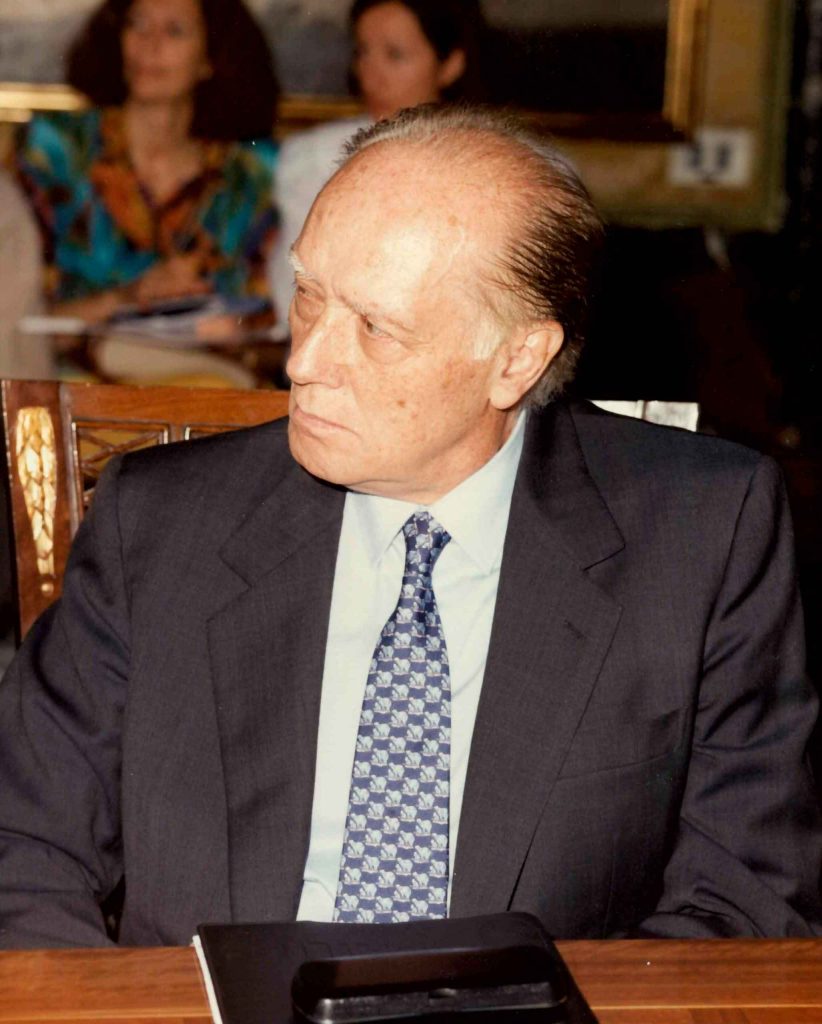HIS LIFE
His goal
Miguel Ángel Prieto, director of Luis Valls’ office, recollects that in the summer of 2005, Valls began to feel weak and tired. By then, he already had certain limitations; his vision was failing, and he could neither read nor walk without assistance because he would trip and fall. “Despite the physical deterioration, he kept his mind was perfectly sharp until the end,” Prieto notes.
Skin Cancer
Several melanomas had to be removed in the context of an increasingly complicated health situation. Although there were no complications during surgery, weeks later, he suffered renal failure, from which he could not recover.
When the possibility of dialysis was considered, the ICU doctor at the Ruber Hospital was in favor of not prolonging his life artificially. At 79, his end was imminent.
Last Days at the Bank
Luis Valls bade farewell to his team, planning to return once the cumbersome bandages were removed. After the October 2005 board meeting, he announced this: “I’m leaving for a few days; I’m having surgery. I’ll be back when I look better.” He thought it would be a matter of weeks, but he never returned to his office and died in February 2006.
A Farewell Letter
“I wish to die peacefully – like the holy Patriarchs – as I have lived.” Thus begins a letter 1 that his executor, Francisco Aparicio, describes as “two sheets, both written on the back of used paper,” written twelve years before his death and which continued as follows: “I therefore beg, please, that my friends be left in peace. I wish to die away from civilization to make the above easy to fulfill. No publicity is desirable: no announced burial or funeral, no obituaries, no necrological notes requested or encouraged. Of course, I would appreciate prayers. But nothing else. Leave everyone in peace (I have nothing of value. Everything can be thrown away). I’m getting old. Death can appear at any moment. When it happens, I wish that my friends be left in peace. It is better not to force them to attend the burial, go to funerals, write an article, etc. Therefore, in my will, I forbid the publication of obituaries. Let everyone pray and encouraged for others to pray without resorting to social activities.”.
His Last Wishes
His brother Javier confirmed that his request was honored2: “Luis did not want obituaries; only one appeared in the ABC and El Mundo newspapers on March 10, 2006, which said: <<Luis, many of us owe you a lot, some owe you everything. Loyalty remains a canine virtue, a prayer looking at heaven>>. Luis did not want honors in his lifetime or after. He only asked for a prayer for his soul.”
In addition to no announcements, he wanted an austere conclusion. José Alcázar Godoy 3 recalls he stated in his will he should be buried in the poorest coffin available and that neither the Bank nor his family should spend money on newspaper obituaries or funeral wreaths. “He wanted to live as an ascetic and die poorly,” he notes. The money he had saved during his tenure as president of the world’s most profitable bank (around nine million euros) was left as an inheritance to the Foundation for the Fomento de Fundaciones, founded by Rafael Termes so that it could be used for loans granted to international social action projects.
A Personal Prayer
Among the hundreds of papers Luis Valls had kept throughout his life, Francisco Aparicio also found a handwritten prayer. He clarifies that he does not know if Luis Valls composed the prayer himself, was inspired by other texts, or copied it, as it had no date or reference to any source. “It was with other notes from the early 1980s,” he specifies. In this prayer, Luis Valls expresses how he wanted to live these final moments, something that, in Aparicio’s opinion, was granted to him.
No Fear of Death
For several years, Luis Valls was on the hit list of ETA a Basque terrorist organization. But he was only concerned about two things: eluding ETA’s intelligence unit which meant the inconvenience of changing routes and ensuring the safety of his bodyguards. In fact, in the top drawer of a simple desk in his bedroom there was a note “In case of kidnapping” with his precise instructions: “Organize the funeral, publish the obituary, and the board should meet immediately to appoint a new president. Under no circumstances negotiate or talk with the terrorists.”
Luis Valls’ goal was for everyone to consider him dead and to accept whatever had to happen, without giving in to extortion. As a Catholic, Luis Valls had a transcendent view of life and death and feared neither ETA nor any other form of leaving this world. He was only concerned about the health of his security staff and, therefore, despite the austerity with which those managing the Bank’s supplies operated, he armored the car he used. He knew it was inevitable that ETA would carry out the threat. But he was not afraid, even though, looking at one of these letters that hundreds of businessmen and executives received at that time (such as the then vice-president of Popular’s board, Gabriel Gancedo), one can get a sense of what it was like to feel that threat (see annex)
Bibliography
(1) The letter is collected in the book Documents>Version 2 Luis Valls-Taberner (Pérez Salas, Fundación para Atenciones Sociales, 2007).
(2) In an article entitled February 25, 2006, seven years later published on February 25, 2013 in the newspaper La Vanguardia, seven years after the death of Luis Valls.
(3) Booklet Luis Valls. From banking to God (José Alcázar Godoy).


